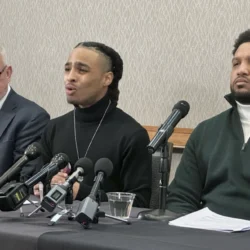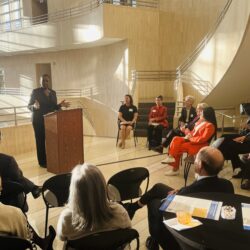
Justice Lawrence Marks testifies about court reopening at Senate judiciary hearing
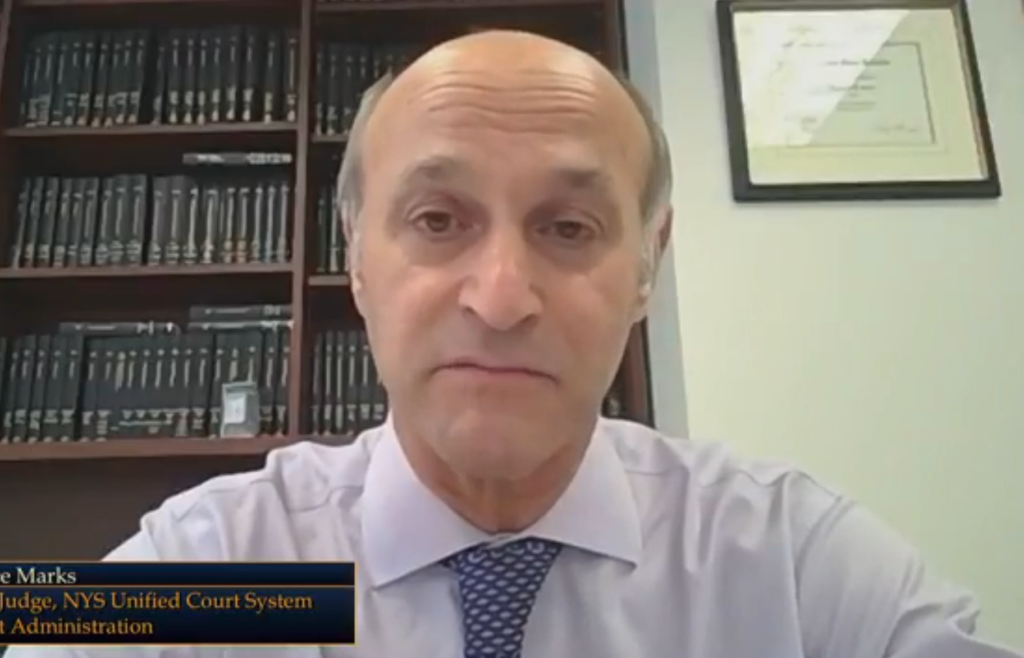
 The New York state court system is still conducting as much business as it can virtually, but it recently returned to in-person trials and reconvened grand juries as it recovers from the fallout of the COVID-19 pandemic.
The New York state court system is still conducting as much business as it can virtually, but it recently returned to in-person trials and reconvened grand juries as it recovers from the fallout of the COVID-19 pandemic.
The court system closed in mid-March for most non-essential services. It began reopening as many services as it could virtually, but in recent weeks has resumed in-person trials and is getting prepared for jury trials in the coming months.
In an effort to ensure that all of this is happening with transparency, the State Senate’s Judiciary, Housing and Codes committees held a hearing on Friday where they spoke with Hon. Lawrence Marks, the chief administrative judge for New York state, to examine how the court system is conducting its reopening.
“We’re concerned today about the safety of litigants, judges and jurors and court staff and also the general public,” said Sen. Brian Kavanagh. “I think there is still a fair amount of uncertainty about how this is all going to work and what the effect will be on public health.
“We’re also concerned about the ways legal determinations that negatively affect New Yorkers and potentially threaten basic needs like housing will impact families and individuals who are already vulnerable because of the pandemic,” Kavanagh continued.
Justice Marks opened the hearing by talking about some of the significant changes that the court system was forced to make in its operations because of the coronavirus.
“Shortly after Governor Cuomo declared a disaster emergency in the state in March, [Chief Judge Janet DiFiore] made the decision that, while the trial courts would remain open to handle essential and emergency matters, all other court matters would be postponed for the foreseeable future,” Chief Administrative Judge Marks said. “Clearly, that was the only choice.”
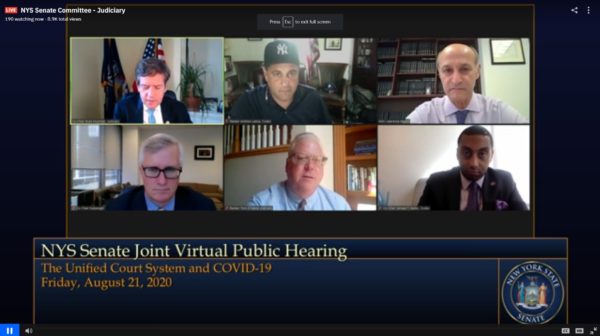
Marks went on to explain that the courts’ first effort was to pivot operations to virtual platforms, which he thinks it handled well. Marks reported that nearly 47,000 virtual arraignments have been conducted since mid-March.
By the middle of April, Marks said that the court system was able to open virtual operations to civil proceedings as well, and noted that Upstate New York cleared its entire backlog of undecided motions, while New York City courts are close to the same achievement.
The second major effort, Marks said, is the move to reopen in-person operations, which he said is being done in a “gradual and deliberate manner” and with the help of an independent epidemiologist — Dr. Amira Roess, a professor of global health and epidemiology at George Mason University’s College of Health and Human Services, Department of Global and Community Health.
“Following the governor’s lead, as the state’s regions have reopened their economies, we have created a parallel, phased approach to allow some matters to be heard in-person in courthouses,” Chief Administrative Judge Marks said.
“Guided by our epidemiologist, we have followed state and federal guidelines in implementing stringent health and safety protocols statewide — including mandating PPE for all judges, staff, court users, and the public, and requiring temperature checks and screenings of all individuals entering court facilities,” Marks continued. “To limit foot traffic and enforce social distancing, we have reimagined court calendars and have continued to rely primarily on virtual capabilities.”
Judge Marks explained during questioning that judges in the Southern District of New York recommended Dr. Roess to the court, as they had previously worked with her. He said that Roess has not actually visited any of the New York City courthouses, but has seen the court’s layout plans and that communication has been conducted over the phone and by email. Roess is not expected to prepare a public report.
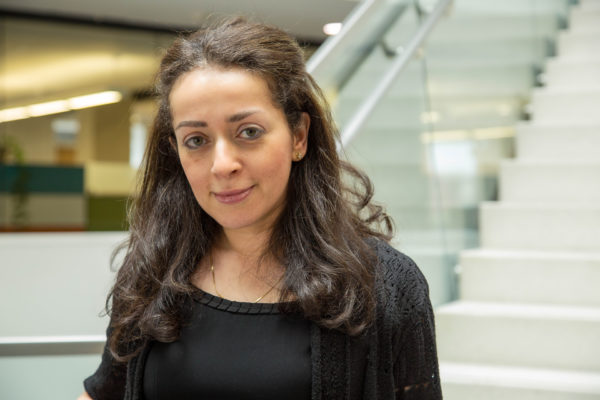
Sen. Brad Hoylman pointed out to Judge Marks that as more indoor places like gyms and restaurants are reopening, they are doing so with air filtration requirements, and asked about air filtration in the courts. Judge Marks wouldn’t say that all courts that have reopened have met similar MERV 13 requirements because older buildings are not always compatible.
“Well, you realize older buildings with older HVAC systems are not compatible with the upgraded filtration systems,” Marks said. “If MERV 13 or higher filters could be installed in all of the courthouses they would be, but it’s not possible. There are other steps that can be taken that will make up for that.”
When asked about social distancing, Chief Administrative Judge Marks explained that the courts are taking steps to ensure that there is no gathering at the entrances to buildings, and that every single person in the courthouses is required to wear masks. Additionally, he said, face shields are available for anyone who wants one. He explained that court officers have been commissioned to enforce social distancing rules as well and that large-volume calendar parts have been eliminated for the time being.
Once the subject of evictions was raised, Justice Marks called upon the Legislature to enact emergency legislation to help deal with the issue rather than to simply have the courts repeatedly extend the moratorium, which he said it may not be able to do again.
“Oct. 1, for us, might be a hard deadline,” Justice Marks cautioned. He went on to say, “We are the judiciary, not the policy-making branch of the government. We urge you to focus on this problem and not rely on us to do that.”
Justice Marks added that foreclosures have been suspended at least until Oct. 15 for similar reasons as eviction cases.
When asked about contact tracing, Marks explained that rapid testing of court employees has been important. He added that the court system has been conducting its own contact tracing internally, but it is in discussions with the governor’s office and New York City about supplementing that program.
“This has been an extraordinary challenge for all of us in the court system,” Chief Administrative Judge Marks said. “I think we’ve done well. Nothing is ever perfect and … we’ve worked extraordinarily hard and we’re very proud. We realize that society can’t survive without a functioning court system. That has become as clear as it has ever been during this pandemic. We will continue to try to do the best we can, and of course the support of the Legislature is always welcome.”
Leave a Comment
Leave a Comment



